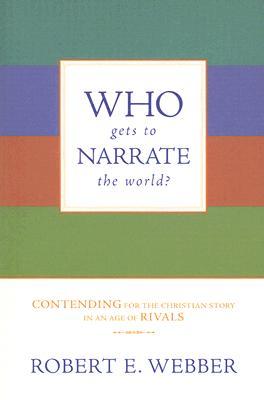- Bible
- Read the Bible
- Bible Versions
- Verse of the Day
- Reading Plans
- Verses by Topic
- Books of the Bible
- Bible Images
- Study
- Commentaries
- Concordances
- Dictionaries
- Encyclopedias
- Sermons
- Bible Atlas & Maps
- BP Wiki
- Devotionals
- Today's Devotionals
- Light of the World
- All Devotionals
- Inspirational Quotes
- More
- Picture Quotes
- Videos
- Inspirational
- Bible Study
- What The Bible Says
- Bible Q&As
- Daily Bread
- Bible by Genre
- Bible Stories
- Random Bible Verse
- Community
- Store
Who Gets to Narrate the World?: Contending for the Christian Story in an Age of Rivals
by Robert E. Webber
Who gets to narrate the world?
The late Robert Webber believed this question to be the most pressing issue of our time. Christianity in America, he preached, will not survive if Christians are not rooted in and informed by the uniquely Christian story that is the gospel of Jesus Christ.
This is the burden of Webber's final book, Who Gets to Narrate the World?: Contending for the Christian Story in an Age of RivalsWho Gets to Narrate the World?: Contending for the Christian Story in an Age of Rivals. Convinced that American evangelicals are facing the demise of their entire way of life and faith, Webber challenges his readers to rise up and engage both the external and internal challenges confronting them today. This means that Christians must repent of their cultural accommodation and reclaim the unique story--the Christian story--that God has given them both to proclaim and to live.
The late Robert Webber believed this question to be the most pressing issue of our time. Christianity in America, he preached, will not survive if Christians are not rooted in and informed by the uniquely Christian story that is the gospel of Jesus Christ.
This is the burden of Webber's final book, Who Gets to Narrate the World?: Contending for the Christian Story in an Age of RivalsWho Gets to Narrate the World?: Contending for the Christian Story in an Age of Rivals. Convinced that American evangelicals are facing the demise of their entire way of life and faith, Webber challenges his readers to rise up and engage both the external and internal challenges confronting them today. This means that Christians must repent of their cultural accommodation and reclaim the unique story--the Christian story--that God has given them both to proclaim and to live.
BUY NOW
Paperback, 137 pages
Published April 24th 2008 by IVP Books
© 2025 Bibleportal.com All rights reserved.

Robert E. Webber (1933 - 2007)
was an American theologian known for his work on worship and the early church. He played a key role in the Convergence Movement, a move among evangelical and charismatic churches in the United States to blend charismatic worship with liturgies from the Book of Common Prayer and other liturgical sources. Webber began teaching theology at Wheaton College in 1968. Existentialism was the primary focus of Webber's research and lectures during his first years at Wheaton. However, he soon shifted his focus to the early church. In 1978 he wrote Common Roots, a book that examined the impact of 2nd-century Christianity on the modern church.In 1985 Webber wrote Evangelicals on the Canterbury Trail: Why Evangelicals Are Attracted to the Liturgical Church, in which he described the reasons behind his own gradual shift away from his fundamentalist/evangelical background toward the Anglican tradition. Webber faced an enormous amount of criticism from evangelicals in response to this book. Nevertheless, his work was highly influential, and his ideas grew in popularity in evangelical circles. During the latter half of his life, Webber took a special interest in Christian worship practices. He wrote more than 40 books on the topic of worship, focusing on how the worship practices of the ancient church have value for the church in the 21st century postmodern era. Among his books are Ancient-Future Worship, Ancient-Future Faith, Ancient-Future Time, Ancient-Future Evangelism, The Younger Evangelicals, and The Divine Embrace.
... Show more